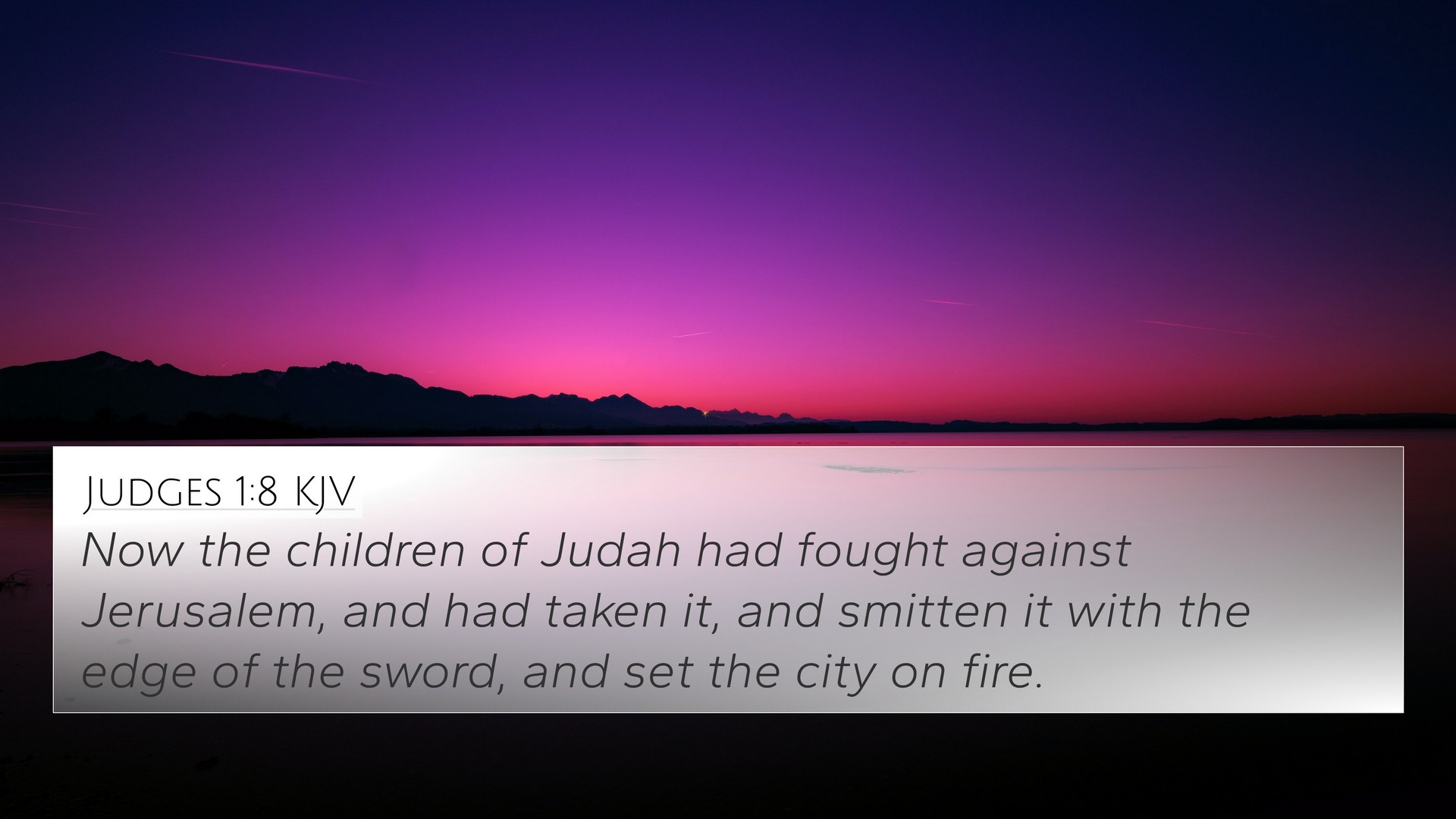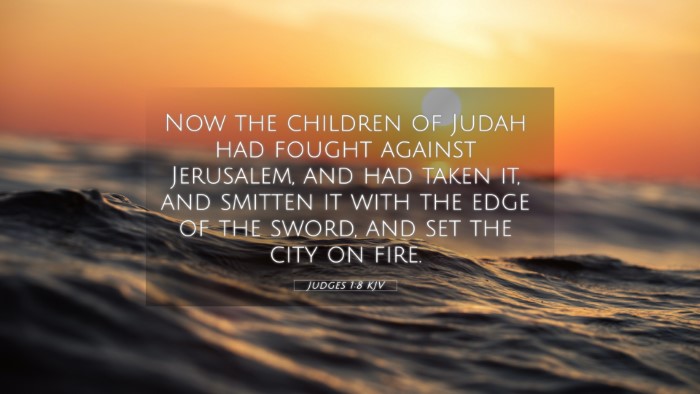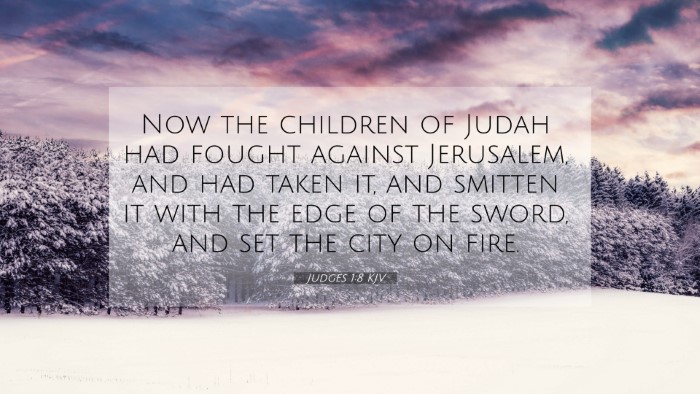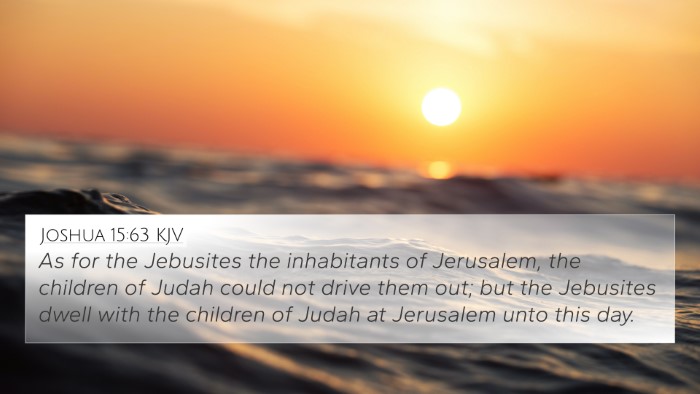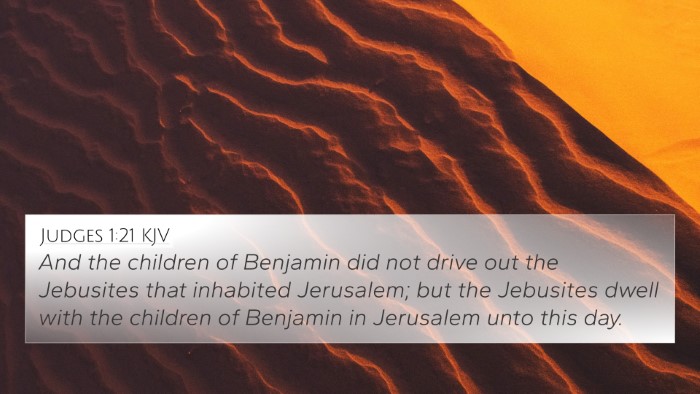Bible Verse Meaning: Judges 1:8
Judges 1:8 states, "And the children of Judah had fought against Jerusalem, and had taken it, and smitten it with the edge of the sword, and set the city on fire." This verse marks a critical point in the history of Israel's conquests in the Promised Land. Below, we will explore its meaning drawing from various public domain commentaries.
Contextual Background
The Book of Judges delineates the challenges and events faced by Israel after settling in Canaan. Judges 1 depicts the initial tribal conquests and territorial battles. This period is characterized by the need to establish control over lands occupied by various Canaanite peoples.
Commentary Insights
Matthew Henry's Commentary
Matthew Henry emphasizes that Judah's conquering of Jerusalem was a fulfillment of God's promise to Israel. It illustrates the faithfulness of God to His covenant. Despite their struggles, God's providence guided the tribe towards success. Henry also reflects on the significance of Jerusalem as a future religious center, hinting at its pivotal role in Israel's spiritual life.
Albert Barnes' Notes
Albert Barnes provides further insight by examining the historical significance of Jerusalem's fall. He notes that the city had already been a thorn in Israel's side, inhabited by the Jebusites, and symbolized the challenges the Israelites would face in fully inheriting the land. Barnes points out that the destruction of Jerusalem foreshadows the eventual establishment of a theocratic rule under David, which would transform the city into the capital of Israel.
Adam Clarke's Commentary
Adam Clarke underscores the military action taken by Judah and the broader implications of their victory. He discusses how the conquest of Jerusalem not only dispelled the immediate threat but also set the stage for Judah's prominence among the tribes of Israel. Clarke emphasizes that the episode demonstrates the courage and strength of Judah, which would ultimately carry on into future battles.
Key Themes
The themes identified in Judges 1:8 include:
- Divine Providence: The verse illustrates how God's guidance facilitates Israel's conquests.
- Fulfillment of Promises: This conquest was a part of the covenant God made with Abraham regarding his descendants inheriting the land.
- Judah's Leadership: Judah's actions signify its leadership role among the tribes of Israel.
- Preparation for Future Kingship: The rise of Judah sets the stage for King David's eventual reign.
Cross-References
Judges 1:8 connects with numerous other verses throughout the Bible. Here are some relevant cross-references:
- Genesis 15:18-21: God's promise to Abraham about the land inheritance.
- Joshua 15:63: The difficulties faced by Judah regarding Jerusalem.
- 2 Samuel 5:6-10: David's conquest of Jerusalem and the establishment of it as Israel's capital.
- Psalm 78:68-70: God's choice of Zion and Judah as His favored place.
- Isaiah 29:1: A prophetic reference to Jerusalem's difficulties.
- Matthew 2:1: Reference to Jerusalem in the context of Christ's birth narrative.
- Hebrews 11:32-34: Celebrating the faith of the judges including Judah's exploits.
Conclusion
Judges 1:8 serves as a crucial part of Israel's narrative, marked by divine assurance and the unfolding of God's redemptive plan through Israel's history. Understanding this verse within the broader biblical framework allows for insightful thematic connections and deeper appreciation of scriptural cross-referencing.
Further Study
For those interested in exploring the links between Bible verses, various resources and tools can be implemented, such as:
- Bible concordance for identifying verse themes.
- Bible cross-reference guides.
- Cross-reference methods for Bible studies.
This exploration into Judges 1:8 and its context encourages deeper reflection on the interconnectedness of Scripture and the historical unfolding of God's redemptive story through Israel.
